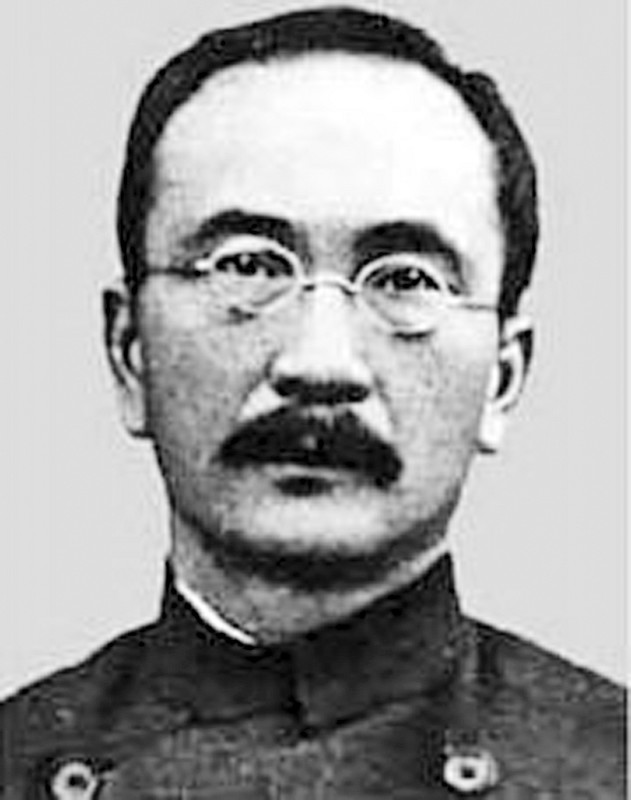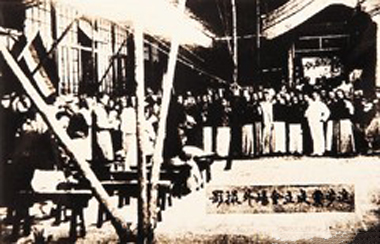|
List Of Premiers Of The Republic Of China
This is a list of the Premiers of the Republic of China since 1912. The Republic of China before 1949 controlled Mainland China as well as offshore islands. The Republic of China since 1949 has only controlled Taiwan and nearby islands. The current Republic of China is usually known as Taiwan. In the country's history, the official title of the head of government has changed over time. Premiers, also known as Presidents of the Executive Yuan, are appointed by the Presidents of the Republic of China, but some premiers were even more powerful than the presidents, during the early age of the Republic of China. Some presidents were even expelled by the premiers they appointed. The title of premier in China was changed several times, so this list is divided into several sections. List Premiers of the Cabinet of the Republic of China (1912–1914) * Period: 13 March 1912 – 1 May 1914 According to the Provisional Constitution of Republic of China, which was passed in 191 ... [...More Info...] [...Related Items...] OR: [Wikipedia] [Google] [Baidu] |
List Of Premiers Of The People's Republic Of China
: ''All the names on this list follow the Eastern order convention (family name first, given name second) for consistency.'' In the People's Republic of China, the Premier is the head of government, and is elected by a delegation of the National People's Congress every five years. Premiers have been limited to two terms of five years since 1982. List of Premiers The Premiership of PRC was created since the establishment of the People's Republic of China on 1 October 1949. ; Generations of leadership: See also * Generations of Chinese leadership * Grand chancellor (China) * List of Chinese leaders * List of premiers of China * List of presidents of the People's Republic of China * List of vice premiers of the People's Republic of China * Paramount leader * Vice President of the People's Republic of China References {{Reflist People's Republic of China China, officially the People's Republic of China (PRC), is a country in East Asia. It is the world ... [...More Info...] [...Related Items...] OR: [Wikipedia] [Google] [Baidu] |
Progressive Party (China)
The Progressive Party () was a political party in the Republic of China from 1913 to 1916. Origins Chinese constitutionalism was a movement that originated after the First Sino-Japanese War (1894-1895). A young group of intellectuals in China led by Kang Youwei argued that China's defeat was due to its lack of modern institutions and legal framework which the Self-Strengthening Movement had failed to deliver. They saw the recent rise of new powers such as Germany, Italy, and Japan coincide with their adoption of constitutions. By having a constitution as the basis for social and political organization, they surmise that all of China's ills could be repaired. Like the Chinese Nationalists, these constitutionalists underwent many name changes after they first coalesced following the end of the Hundred Days' Reform in 1898. The Chinese Empire Reform Association (known as "Baohuanghui" (保皇會) or "Protect the Emperor Society" in Chinese) was formed in Victoria, Canada on 20 ... [...More Info...] [...Related Items...] OR: [Wikipedia] [Google] [Baidu] |
Lou Tseng-Tsiang
Lou Tseng-Tsiang (; 12 June 1871 - 15 January 1949) was a Chinese diplomat and a Roman Catholic priest and monk. He was twice Premier of the Republic of China and led his country's delegation at the Paris Peace Conference of 1919. He sometimes used the French name René Lou in earlier life, and his monastic name was Pierre-Célestin, O.S.B. Biography Lou was born on 12 June 1871 in Shanghai, Jiangsu, and was raised a Protestant in religion and a Confucianist in philosophy. His father, Lou Yong Fong, was lay catechist for a Protestant mission in Shanghai. He studied at home until the age of thirteen, when he entered the School of Foreign Language in Shanghai, specializing in French. He continued his education at the school for interpreters attached to the Foreign Ministry, and in 1893 he was posted to St Petersburg as interpreter (fourth-class) to the Chinese embassy. At that time the diplomatic international language was French, but Lou also gained fluency in Russian. The amb ... [...More Info...] [...Related Items...] OR: [Wikipedia] [Google] [Baidu] |
Lou Tseng-Tsiang 01
Lou may refer to: __NOTOC__ Personal name * Lou (given name), a list of people and fictional characters *Lou (German singer) *Lou (French singer) * Lou (surname 娄), the 229th most common surname in China * Lou (surname 楼), the 269th most common surname in China Arts and entertainment * ''Lou'' (2010 film) * ''Lou'' (2017 film), a Pixar short * ''Lou'' (2022 film), a Netflix action thriller * Lou!, a French series of comic books created by Julien Neel * Lord of Ultima, a browser-based MMORTS game developed by EA Other uses * Lyon Olympique Universitaire, a rugby union team playing in the Top14 competition of France * Bowman Field (airport) (IATA airport code LOU), an airport in Louisville, Kentucky, USA * Lou Island of Papua New Guinea * Lou language (Austronesian) of Lou Island * Lou language (Torricelli) * Letter of understanding A Letter of Understanding (LOU) is a formal text that sums up the terms of an undertakings of a contract which may have been negotiated up t ... [...More Info...] [...Related Items...] OR: [Wikipedia] [Google] [Baidu] |
Yuan Shikai
Yuan Shikai (; 16 September 1859 – 6 June 1916) was a Chinese military and government official who rose to power during the late Qing dynasty and eventually ended the Qing dynasty rule of China in 1912, later becoming the Emperor of China. He first tried to save the dynasty with a number of modernization projects including bureaucratic, fiscal, judicial, educational, and other reforms, despite playing a key part in the failure of the Hundred Days' Reform. He established the first modern army and a more efficient provincial government in North China during the last years of the Qing dynasty before forcing the abdication of the Xuantong Emperor, the last monarch of the Qing dynasty in 1912. Through negotiation, he became the first President of the Republic of China in 1912. This army and bureaucratic control were the foundation of his autocratic rule. In 1915 he attempted to restore the hereditary monarchy in China, with himself as the Hongxian Emperor (). His death in 1916 ... [...More Info...] [...Related Items...] OR: [Wikipedia] [Google] [Baidu] |
Nonpartisan
Nonpartisanism is a lack of affiliation with, and a lack of bias towards, a political party. While an Oxford English Dictionary definition of ''partisan'' includes adherents of a party, cause, person, etc., in most cases, nonpartisan refers specifically to political party connections rather than being the strict antonym of "partisan". Canada In Canada, the Legislative Assembly of the Northwest Territories and the Legislative Assembly of Nunavut are the only bodies at the provincial/territorial level that are currently nonpartisan; they operate on a consensus government system. The autonomous Nunatsiavut Assembly operates similarly on a sub-provincial level. India In India, the Jaago Re! One Billion Votes campaign was a non-partisan campaign initiated by Tata Tea, and Janaagraha to encourage citizens to vote in the 2009 Indian general election. The campaign was a non-partisan campaign initiated by Anal Saha. Philippines In the Philippines, barangay elections (elections ... [...More Info...] [...Related Items...] OR: [Wikipedia] [Google] [Baidu] |
Tang Shaoyi
Tang Shaoyi (; 2 January 1862 – 30 September 1938), also spelled Tong Shao Yi, courtesy name Shaochuan (), was a Chinese statesman who briefly served as the first Premier of the Republic of China in 1912. In 1938, he was assassinated by the staff of the Bureau of Investigation and Statistics in Shanghai. Early life Tang was a native of Xiangshang County, Guangdong. Tang was educated in the United States, attending elementary school in Springfield, Massachusetts, and high school in Hartford, Connecticut. He later studied at Queen's College, Hong Kong, and then Columbia University in New York on the Chinese Educational Mission. He was a member of Columbia College's class of 1882 before being recalled back to China by the Qing government. Tong was a classmate and close friend of future Columbia president Nicholas Murray Butler. Career Tang was a friend of Yuan Shikai; and during the Xinhai Revolution, negotiated on the latter's behalf in Shanghai with the revolutionaries' Wu ... [...More Info...] [...Related Items...] OR: [Wikipedia] [Google] [Baidu] |
President Of The Republic Of China
The president of the Republic of China, now often referred to as the president of Taiwan, is the head of state of the Republic of China (ROC), as well as the commander-in-chief of the Republic of China Armed Forces. The position once had authority of ruling over Mainland China, but its remaining jurisdictions has been limited to Taiwan, Penghu, Kinmen, Matsu and other smaller islands since the conclusion of Second Chinese Civil War. Originally elected by the National Assembly, the presidency was intended to be a ceremonial office with no real executive power as the ROC was originally envisioned as a parliamentary republic. Since the 1996 presidential election, the president is directly elected by plurality voting to a four-year term, with incumbents limited to serving two terms. The incumbent, Tsai Ing-wen, succeeded Ma Ying-jeou on May 20, 2016, to become the first female president in the history of Taiwan. Qualifications * The ''Presidential and Vice President ... [...More Info...] [...Related Items...] OR: [Wikipedia] [Google] [Baidu] |




